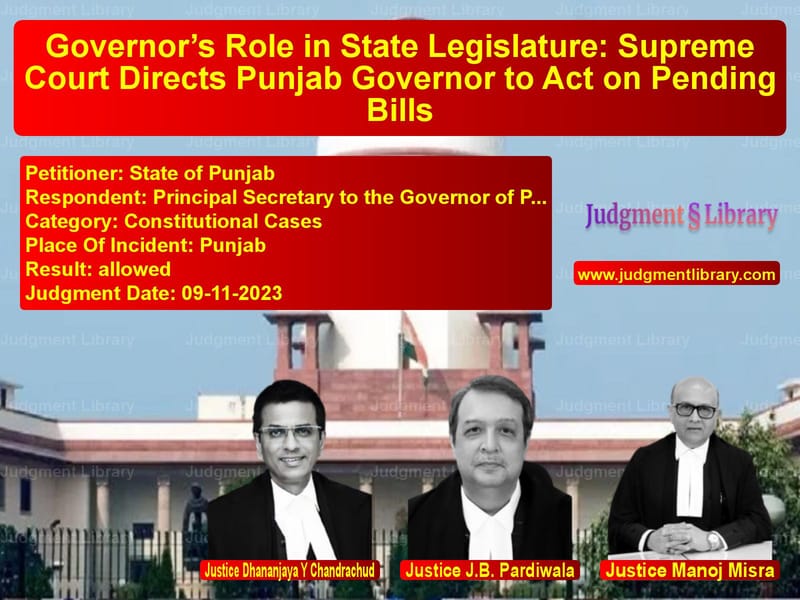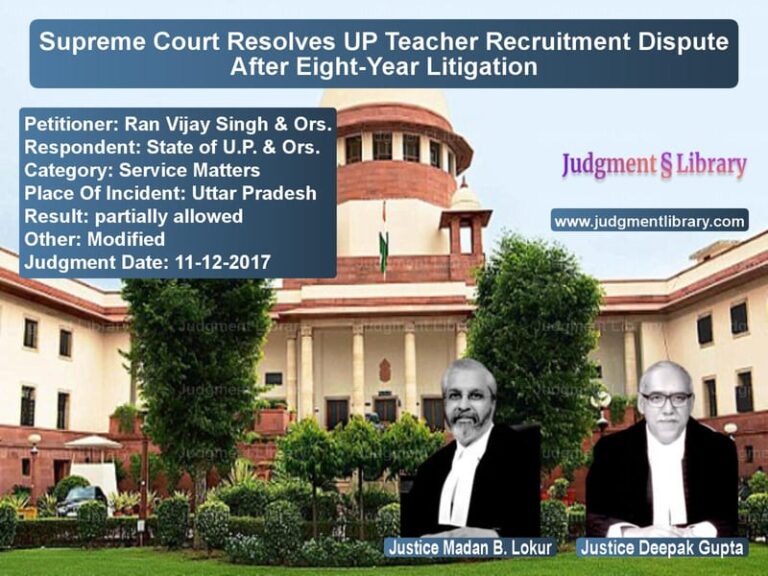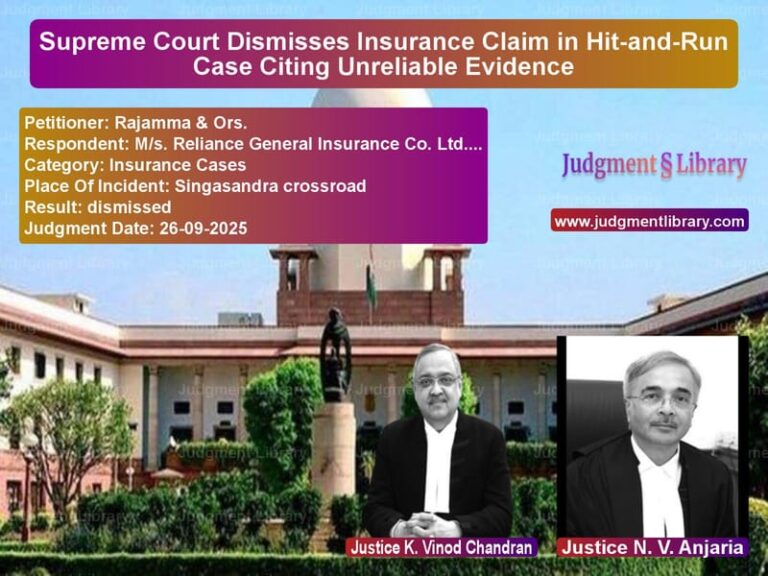Governor’s Role in State Legislature: Supreme Court Directs Punjab Governor to Act on Pending Bills
The case of State of Punjab v. Principal Secretary to the Governor of Punjab & Another addresses critical constitutional questions concerning the role of the Governor in approving Bills passed by the State Legislature. The Supreme Court ruled on whether the Governor can indefinitely withhold assent to Bills and whether the Speaker has the authority to reconvene a legislative session that has been adjourned sine die.
Background of the Case
The dispute arose when the Governor of Punjab refused to act on four Bills passed by the Punjab Vidhan Sabha and did not provide the necessary recommendation for introducing three Money Bills. The State of Punjab approached the Supreme Court under Article 32 of the Constitution, seeking directions for the Governor to act on the pending Bills.
The case involved the following Bills:
- The Sikh Gurdwaras (Amendment) Bill, 2023
- Punjab Affiliated Colleges (Security of Service) (Amendment) Bill, 2023
- Punjab Universities Law (Amendment) Bill, 2023
- Punjab Police (Amendment) Bill, 2023
Additionally, three Money Bills required the Governor’s recommendation under Article 207(1):
- The Punjab Fiscal Responsibility and Budget Management (Amendment) Bill, 2023
- The Punjab Goods and Services Tax (Amendment) Bill, 2023
- The Indian Stamp (Punjab Amendment) Bill, 2023
Arguments of the Petitioner
The State of Punjab, represented by senior counsel Dr. Abhishek Manu Singhvi, argued:
- The Governor had no discretion to withhold assent indefinitely.
- The Speaker had the constitutional authority to reconvene the session since it had been adjourned sine die and not prorogued.
- The Governor’s refusal to act on the Bills amounted to an unconstitutional obstruction of the legislative process.
- The Governor’s actions undermined democracy and the basic structure of federalism.
Arguments of the Respondent
The Principal Secretary to the Governor, represented by senior counsel Mr. Satya Pal Jain, contended:
- The Vidhan Sabha’s session had effectively ended and could not be reconvened without a fresh proclamation.
- The Governor had concerns about the legality of the session where the Bills were passed.
- The Governor had already assented to 185 Bills in the past, proving there was no undue delay.
Supreme Court’s Observations
1. Governor as a Symbolic Head
The Supreme Court reiterated that the Governor acts as a constitutional figurehead and must function within the framework of parliamentary democracy. The Court emphasized:
“The Governor is bound by the aid and advice of the Council of Ministers and cannot act independently in matters where he does not have discretion under the Constitution.”
2. Governor Cannot Withhold Assent Indefinitely
The Court ruled that Article 200 of the Constitution does not allow the Governor to indefinitely withhold assent to Bills passed by the legislature. The Governor must either:
- Give assent to the Bill
- Withhold assent and return it to the legislature with recommendations
- Reserve it for the consideration of the President
The Court stated:
“The phrase ‘shall declare’ in Article 200 implies that the Governor must act on the Bills presented to him within a reasonable time.”
3. Speaker Has the Authority to Reconvene an Adjourned Session
The Court upheld the Speaker’s authority to reconvene the Punjab Vidhan Sabha after it had been adjourned sine die, citing Rule 16 of the Punjab Vidhan Sabha’s Rules of Procedure. It noted that several other legislatures and Parliament itself follow similar practices.
4. Federalism and Democratic Governance
The Court warned against Governors obstructing legislative processes, stating:
“Federalism and democracy, both parts of the basic structure of the Constitution, are inseparable. When one feature is diluted, it puts the other in peril.”
Final Judgment
The Supreme Court directed the Governor of Punjab to act on the pending Bills in accordance with Article 200. It ruled that:
- The Governor must either assent to or return the Bills with recommendations.
- The session of the Punjab Vidhan Sabha on June 19–20 and October 20, 2023, was constitutionally valid.
- The Governor’s actions had no legal basis to cast doubt on the validity of the legislative process.
The Court, however, clarified that it was not directing the Governor to assent but only to act in accordance with the constitutional provisions.
Key Takeaways
1. Governors Cannot Stall Bills Indefinitely
The ruling establishes that Governors must act on Bills in a timely manner and cannot obstruct the legislative process by withholding assent indefinitely.
2. Speakers Can Reconvene Adjourned Sessions
The judgment affirms that a session adjourned sine die can be reconvened by the Speaker without requiring a new proclamation.
3. Strengthening Democratic Governance
The Supreme Court reinforced the principles of parliamentary democracy, ensuring that elected representatives retain control over governance without undue interference from Governors.
Conclusion
This landmark judgment reinforces constitutional governance by ensuring that Governors act within their defined roles and do not obstruct legislative processes. The ruling affirms the supremacy of the elected legislature in the democratic framework of India.
Petitioner Name: State of Punjab.Respondent Name: Principal Secretary to the Governor of Punjab & Another.Judgment By: Justice Dhananjaya Y Chandrachud, Justice J.B. Pardiwala, Justice Manoj Misra.Place Of Incident: Punjab.Judgment Date: 09-11-2023.
Don’t miss out on the full details! Download the complete judgment in PDF format below and gain valuable insights instantly!
Download Judgment: state-of-punjab-vs-principal-secretary-supreme-court-of-india-judgment-dated-09-11-2023.pdf
Directly Download Judgment: Directly download this Judgment
See all petitions in Legislative Powers
See all petitions in Public Interest Litigation
See all petitions in Separation of Powers
See all petitions in Judgment by Dhananjaya Y Chandrachud
See all petitions in Judgment by J.B. Pardiwala
See all petitions in Judgment by Manoj Misra
See all petitions in allowed
See all petitions in supreme court of India judgments November 2023
See all petitions in 2023 judgments
See all posts in Constitutional Cases Category
See all allowed petitions in Constitutional Cases Category
See all Dismissed petitions in Constitutional Cases Category
See all partially allowed petitions in Constitutional Cases Category







